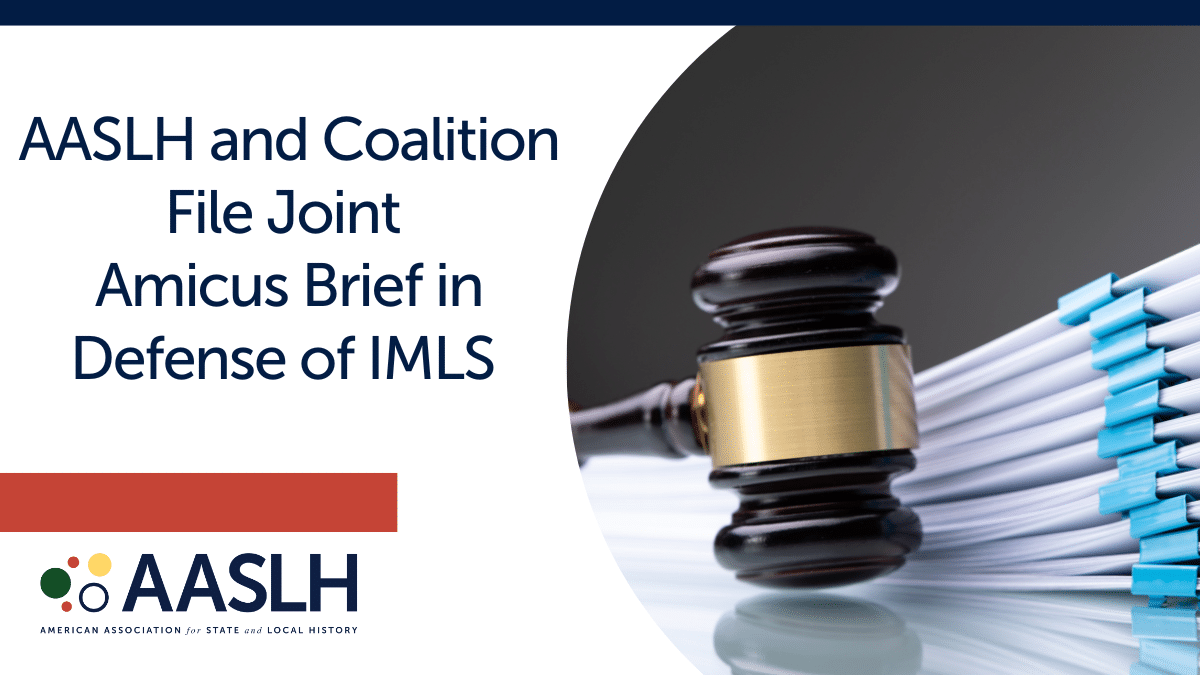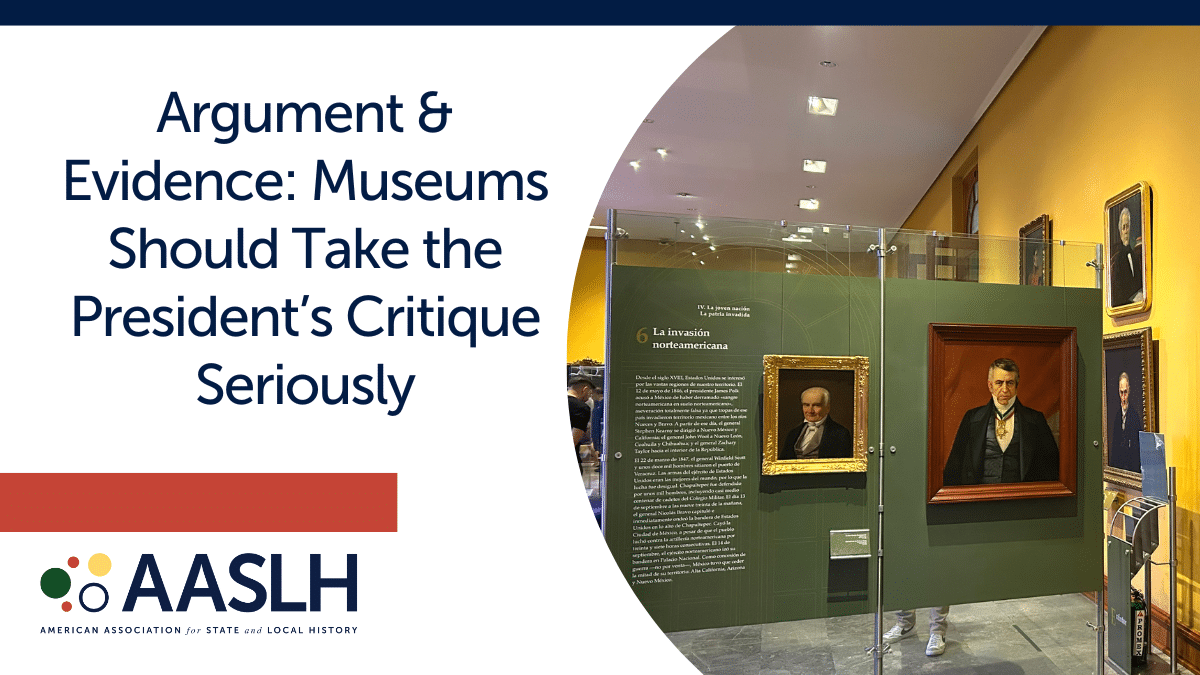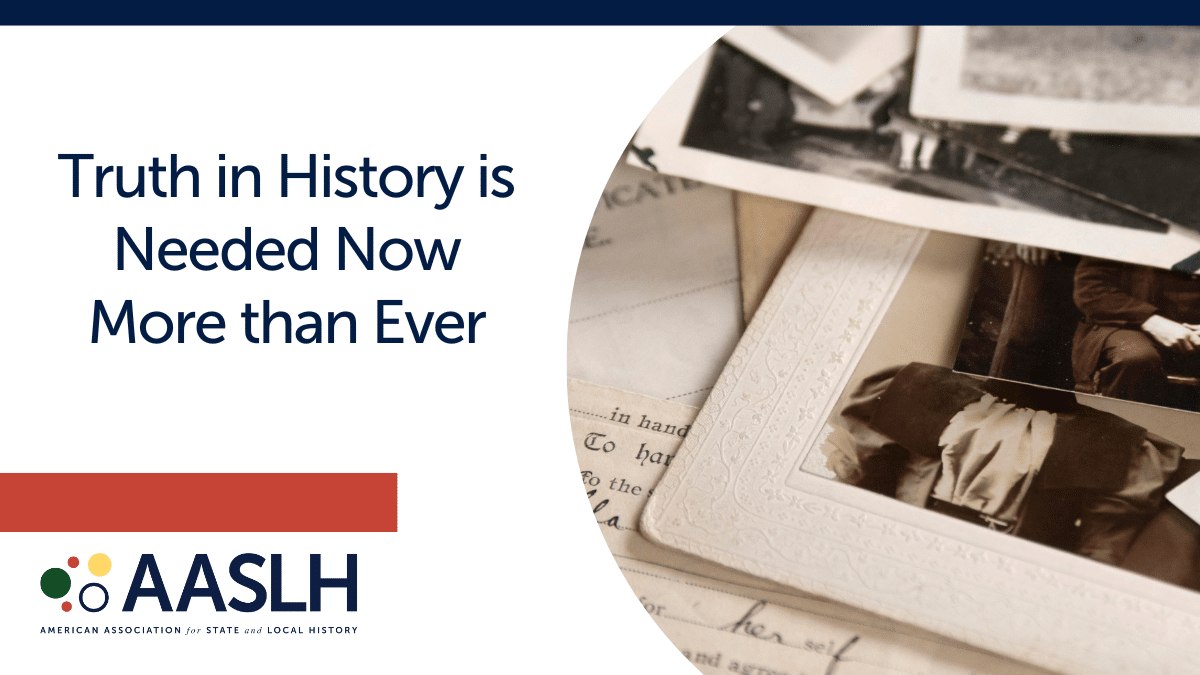
Once or twice a year we ask the chairs of AASLH committees to summarize what their group has been working on and plans to accomplish in the coming months. In most cases, the chair authored the report, though in some instances it was a staff member. While the main purpose for these summaries is to aid the AASLH Council and staff in planning, we’re pleased to share these updates with our members in a multi-week blog series. This week’s post covers the activities of our Affinity Communities, member-led groups that focus their discussions and programming on specific areas of interest and concern. Learn more about these groups and join their open discussion forums here.
Educators and Interpreters
Chair: Sarah Jencks, Ford’s Theatre
- Formalized a quarterly “Unwind” program, an informal educators/interpreters virtual gathering
- Planned and offered a series of webinars on aspects of indigenous history with committee member Heather Bruegl
- Worked with Conference Co-Chair Michelle Moon to create a series of “silo-busting” sessions for the virtual conference, featuring conversations about land conservation, democratic engagement, and civic learning
- Set up a transparent and equitable system for recruiting and vetting applicants for the E&I steering committee that dramatically increased applications and ended up with a more ethnically, racially, and geographically diverse steering committee than we have had in years
- Re-structured the steering committee to create three cohorts of five members each, serving three-year terms, so that there is more manageable attrition
- Instituted a four-person leadership team, made up of Chair, Chair-Elect, Co-Chair, and Leader At-Large, that meet monthly, in addition to the monthly meetings of the steering committee
2022 Goals:
- Continue with quarterly E&I Unwinds and three to four webinars or more formal learning sessions during the year
- Work closely with the Conference Program Committee co-chairs to provide support for conference session development
- Commission or write two to three blog posts that are linked to webinar programming
- Create clearer and more welcoming options for involvement of E&I workers at all stages of their careers to participate in programming and contribute to the field
Emerging History Professionals
Chair: Casey Wooster
The Emerging History Professional Affinity Community contributed to two AASLH events this year: an interactive webinar and a happy hour at the online conference (which they usually partake in). The webinar discussed best practices for presenting and submitting sessions for conferences. Their happy hour produced some great discussion and encouragement. They are hoping to create more content modeled after this year’s webinar next year, too, and potentially creating some type of series.
Field Services Alliance
Chair: Amanda Higgins, Kentucky Historical Society
The Field Services Alliance has been hard at work adapting best practices for field services in the age of COVID. As we continue to perfect Zoom, we are also getting back to our roots and updating our core documents. We have submitted proposals for a collections assessment workshop, an FSA Tips session on working with descendant communities, and a “What is FSA?” session for the AASLH conferences. We also successfully hosted a virtual spring training in April 2021, focusing on inclusive practices in outreach, especially centered on hearing-impaired individuals. We also hosted our annual meeting virtually in October 2021, where we discussed working with Indigenous groups, repatriation, and NAGPRA, among other things.
For 2022: FSA’s goals are to fully update the core documents, including the Field Services Manual; host a virtual spring training that will incorporate providing inclusive and accessible services; successfully host a collections assessment training with the Buffalo meeting; and continue to provide high quality, outreach and field services to our colleagues across the country.
Historic House Museums
Chair: Jessica VanLanduyt, Atlanta History Center
The Historic House Committee hosted events at the Annual Meeting as well as a fun Happy Hour during the 2021 Online Conference. The group played trivia and other games and provided a good networking opportunity. They are also working on a Technical Leaflet for an issue of History News that will be an update of the “How Sustainable is Your Historic House Museum?” leaflet from 2008.
Military History
Chair: Marc Blackburn, National Park Service
This last year was a transition year and it is my hope that as 2022 moves forward we can tap the enthusiasm of new blood and create a sound foundation to move on. The previous cohort of leadership dropped out in 2021 to move on. I did not want the committee to wither on the vine, so with staff help and interest shown at the 2020 annual meeting, I have been able to recruit a cadre of core members who are interested in moving the committee forward. In 2021 we took part in both the live and virtual workshops. The results were well received and has resulted in interest in producing an article for History News for 2022.
2022 goals:
- Continue to take part in the 2022 workshops
- Continue to recruit and build a new management team so the committee can become a more consistent presence in the AASLH universe
- Identify members who can take on specific roles within the committee
Nomenclature Committee
Chair: Jennifer Toelle, Smoky Hill Museum
The committee, in partnership with the Canadian Heritage Information Network, maintains the online free version of museum Nomenclature. The online version integrates the latest edition of Robert Chenhall’s museum cataloging standard with data from the Parks Canada Visual and Descriptive Dictionary and The Getty’s Art & Architecture Thesaurus. The committee routinely reviews and vets new terminology and hierarchical edits submitted from the profession across North America. AASLH’s Nomenclature Committee works closely with Canada’s Nomenclature Committee to ensure bilingual translation into French. There is room for expansion of this online cataloging tool. By integrating the Parks Canada Visual Dictionary, many terms have images associated–however there are several terms without an image identified. The committee has created an images sub-committee to work on adding copyright free images to nomenclature.info. There is also a potential expansion to include more language translations. For example, if you reference the word chair, the data expands to see the term in multiple languages including Spanish and Cree.
2022 Goals:
- An images sub-committee will work on compiling and vetting images for Fashion and Tool terminology.
- Will work on promotion of SPARQL endpoint and APIs. Promotion will be targeted to collections management to software vendors and museums with their own systems.
- In 2021, a complete review of Art terminology and hierarchy was completed by Art sub-committee and reviewed by the Nomenclature committee. It is currently in the translation process and will be added to Nomenclature.info in 2022.
- Work in subcommittees to review terminology in Dolls & Accessories; Religious Objects; Artillery/Military, Vessels, Parts & Components.
- Website usage statistics for Nomenclature.info in 2021: United States: 20,111; Canada: 21,147; Global: 48,282.
Religious History
Chair: Susan Fletcher, The Navigators
Fall 2021: The Religious History Committee held a well-attended session at the in-person AASLH Conference. We talked about how history organizations can utilize religious history to talk about social justice issues, and how to form strong community partnerships. Winter 21-22: The Religious History Committee is delighted to participate in Ken Turino and Max van Balgooy’s forthcoming AASLH book Interpreting Christmas. They asked our group to craft a list of best practices when interpreting the religious aspects of Christmas. The RHC is honored to be able to provide practical help to our colleagues who may have questions or anxieties about how to talk about this potentially controversial topic in an inclusive and historically-grounded way.
Spring 22 and beyond: My goal as the committee chair is to assess the ways that our committee can provide help and resources to the people working in our field. We are finding a new openness to talking about religion and spirituality as a major factor in personal identity-making and in community building. We are also discovering a lack of religious literacy among our museum colleagues, which can pose challenges for people who are trying to interpret objects such as Torah scrolls or paintings with Biblical themes. Although our committee was originally created to serve people who work for religious organizations or sites with religious themes, we’re broadening our mission by creating best practices and resources for how any public historian can approach religious topics with sensitivity.
Small Museums
Chair: Jacqui Ainlay-Conley, Buffalo Bill Museum and Grave
The year started with a facilitated planning meeting. One outcome was adding language about inclusion, equity, and diversity to the Small Museums Committee’s home page, encouraging small museums to include all voices and histories in their work. During the year committee members provided feedback on the draft of the Field Guide for the 250th, including program themes. Committee members supported the launch of the Small Museums Community Center and participated in discussions. At the onsite conference, the committee helped Dr. John Marks plan for “Making History at 250: Small Museums Town Hall,” and held a committee meeting for attendees who wanted to learn more about what we do and learn how to become a committee member. Three of the attendees joined the committee following that meeting. The committee awarded two scholarships to the online conference and hosted a brown bag lunch, “Self-Care for Small Museum Workers,” which forty-eight people attended, as well as a small but fun and lively Happy Hour for thirteen attendees. In December, committee members collaborated with Council Member Stacy Klinger to establish a way to honor Council Member and Small Museum Committee Member Jeff Harris by raising funds to support the professional development for primarily volunteer-run organizations. To date, $1,155 has been raised.



